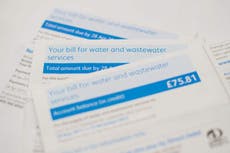Cut the waterworks! Your apology for sewage stinks
English water companies want you to know they’re sorry for dumping human excrement in the sea and rivers. No one told them it was wrong. They really didn’t think you’d mind...

Your support helps us to tell the story
From reproductive rights to climate change to Big Tech, The Independent is on the ground when the story is developing. Whether it's investigating the financials of Elon Musk's pro-Trump PAC or producing our latest documentary, 'The A Word', which shines a light on the American women fighting for reproductive rights, we know how important it is to parse out the facts from the messaging.
At such a critical moment in US history, we need reporters on the ground. Your donation allows us to keep sending journalists to speak to both sides of the story.
The Independent is trusted by Americans across the entire political spectrum. And unlike many other quality news outlets, we choose not to lock Americans out of our reporting and analysis with paywalls. We believe quality journalism should be available to everyone, paid for by those who can afford it.
Your support makes all the difference.“Nona-” is the standard prefix for things to do with the number nine – so where do you put the hyphen when nine different water companies say sorry at once? Is it a nona-apology or just a non-apology? The latter feels right, somehow.
It takes a considerable amount of effort from the very-well-remunerated PR people of the UK’s nine largest water companies to pull this kind of thing together.
Water UK want you to know they’re sorry. They’re sorry, specifically, for pumping the seas and the rivers full of human s***. No one told them it was wrong. They really didn’t think you’d mind. But now that such a fuss has been made – now there are giant algal blooms invading, say, Lake Windermere – they realise that maybe they shouldn’t have done it.
When the TV news began to feature interviews with exasperated parents on holiday in Devon, having a picnic on the beach and trying to stop their toddlers from running into the sea right next to a sign warning them it’s just been flooded with raw sewage, it was then that they realised something was maybe going wrong.
Actually, no. It wasn’t even then. This morning’s big mea culpa is a lot more than a mea culpa. The “We’re sorry, we’re sorry, we’re so so sorry” part also comes with a promise to “invest £10bn” in reducing sewage overflows. And, slightly further down, it comes with a promise to raise your bills to pay for it.
That £10bn, by the way, is spread over 10 years, so that’s £1bn a year, to be paid for by customers who can’t switch, can’t complain, can’t do anything at all. And that annual amount is just £400m short of the £1.4bn the nine companies that make up Water UK paid in dividends to their shareholders last year.
Dividends, it hardly needs to be explained, are paid on profits. Profits are generated by well-run companies who manage to provide satisfactory services to customers at acceptable prices. You arguably do not need an MBA to understand that a cartel of privatised water companies who have made the country’s most popular swimming spots unsafe to swim in are not quite managing to meet their most basic obligations.
Filling the sea with s***, then knocking on doors to demand more money to make it partially go away, is not something even the Sicilian mafia ever dared to try. There would have been a revolution. In this country, we just begrudgingly accept it. Actually swimming in the waters of our island home is just something to aspire to now; something that might be possible again one day. Sunlit uplands and all that.
When the banks failed, they were temporarily nationalised. Short of Britain actually running out of water, it seems impossible to conceive of how a privatised water network could fail more spectacularly than by destroying the country’s water systems.
The water companies have come to specialise in taking our breath away, but the gouging non-apology is still up there with their very best work. They could hardly have demonstrated better that a privatised water network is an almost immaculately terrible idea, and that it can only ever benefit shareholders at the expense of customers.
Throughout the developed world, private water companies were nationalised in the 19th century for exactly the same reasons that fire companies were – because not doing so would have been unworkable and generally mad.
“It is difficult, if not impossible, to combine the citizens’ rights and interests and the private enterprise’s interests, because the private enterprise aims at its natural and justified objective, the biggest possible profit,” said Joseph Chamberlain, when arguing for water nationalisation in 1884.
Only a tiny number of countries have ever gone back to a fully privatised water supply. The most notable examples are those bastions of good governance Bolivia, Colombia, Argentina, the Philippines – and the United Kingdom. Or, more accurately, England and Wales, under Thatcher.
In respect of the first four, it is not too outrageous to say that the decision was driven by blatant corruption. Of course, over here, it was instead ideological. And it is for the same reasons, of free-market infallibility, that we should all just quietly suck it up and pay a bit extra for some of the excrement to be taken away – but we mustn’t leave the shareholders out of pocket.
Is there an alternative? Two months ago, Keir Starmer dropped his plans to renationalise the water and energy companies for reasons neither he nor Rachel Reeves has ever quite made clear. Certainly it suits governments, and would-be governments, better to be able to blame greedy water companies than to tackle the problem themselves, which would involve admitting, straight away, that the consequences of decades and decades of neglect are going to take at least £100bn to fix, not £1bn a year for 10 years.
And in the meantime? Well, they’ve said sorry, haven’t they. They’re going to try their best to deal with a problem they’ve been ignoring for 30 years, just as long as you pay for it first. And you’re not going to have any choice but to swallow it, either.



Join our commenting forum
Join thought-provoking conversations, follow other Independent readers and see their replies
Comments